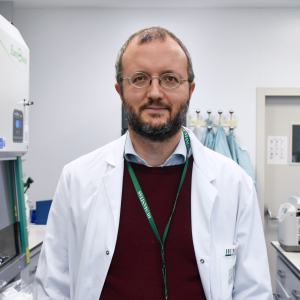Research Group
Kallikourdis Group
Adaptive Immunity Lab
Our lab aims to decipher the role of adaptive immunity in cardiovascular diseases and tumor immunotherapy-induced cardiotoxicity, with the final goal of developing new therapeutic, diagnostic and prognostic strategies.
The challenge
Cardiovascular disease, together with cancer, are the major causes of morbidity and mortality. Several forms of cardiac pathology are in urgent need of clinical solutions.
The hypothesis
The evolution of adaptive immunity may have been shaped by the evolution of mammalian pregnancy – as the latter requires recognition and active tolerance by the former of paternally-derived antigens. This leads to an immune system that may not be optimized beyond the reproductive age of the female. As a consequence, adaptive immunity and inflammation may play key but mal-adapted roles in cardiovascular diseases and cancer – diseases tightly linked to aging. Unraveling the role of adaptive immunity in cardiovascular disease, down to the cellular and molecular level, could lead to new therapeutic and diagnostic/prognostic strategies for cardiovascular disease, as well for the cardiac side-effects of tumor immunotherapy.
Research areas
Adaptive immunity in Cardiovascular Disease
A few years ago we identified, via immune-phenotyping, an association between the presence of pro-inflammatory T cells in cardiac tissue and heart failure progression. On the basis of these findings, we used an FDA-approved drug that interferes with T cell function (T cell costimulation inhibitor) in order to treat different forms of heart failure in mice, successfully hindering disease progression (PMIDs: 28262700, 32806992). This protocol has since been successfully used in human oncology patients suffering from tumor immunotherapy-induced cardiotoxicity (PMIDs: 31189043, 33257470, 36815259).
In parallel, we have also developed therapies manipulating adaptive immunity for therapeutic purposes for vascular disease (PMID: 32931583). We are currently developing several, more advanced strategies for the therapeutic manipulation of adaptive immunity in cardiac disease.
To unravel more mechanistic details, we performed an extensive single-cell RNASeq mapping of the cardiac immune infiltrate in Heart Failure (PMID: 31661975). The results offered novel mechanistic explanations for several clinical observations, validating the hypothesis that manipulation of adaptive immunity may hold great potential for clinical benefit in cardiovascular disease.
Most recently, we uncovered that Long-COVID-19 patients with cardiac symptoms share autoimmune adaptive responses against heart auto-antigens (PMID: 37549204). These responses were sufficient to generate cardiac pathology. Their triggering mechanism, based on bystander activation, may also explain the diversity of Long-COVID symptoms.
Our immunophenotyping efforts are currently extending in the deep immuno-cardio-characterization of extensive cohorts of human cardiac disease patients. This analysis includes innovative aspects of deciphering the antigen specificity of the T cell responses against the heart. These collective efforts are likely to yield novel prognostic/diagnostic tools, as well as strengthen the case for the translational relevance of cardio-immunotherapy.
Adaptive immunity and Cardiovascular Disease in the female, in the context of reproduction
Our past work has revealed how the physiology of reproduction in the female mammal may be a crucial driver for the evolution of regulation of adaptive immunity (PMIDs: 14758358, 17197426, 17440618, 22004905, 32296427). A corollary is that the centrality of reproduction in mammals offers a powerful key to unravel how immunity functions; by extension, this will affect the incidence and progression of cardiovascular disease. The lab has several ongoing projects examining aspects of this question.
Selected publications
Immune checkpoints in cardiac physiology and pathology: therapeutic targets for heart failure.
Long COVID-19 Cardiac Complications Are Associated With Autoimmunity to Cardiac Self-Antigens Sufficient to Cause Cardiac Dysfunction.
CD4(+) T Cell Subsets and Cardiovascular Disease in People With HIV.
An Immune Checkpoint Inhibitor Heart: How CD45RA(+) Effector Memory CD8(+) T Cells (Temra) Are Implicated in Immune Checkpoint Inhibitor Myocarditis.
Immunometabolic Mechanisms of Heart Failure with Preserved Ejection Fraction.
Adoptive transfer of CX3CR1 transduced-T regulatory cells improves homing to the atherosclerotic plaques and dampens atherosclerosis progression.
T Cell Costimulation Blockade Blunts Age-Related Heart Failure.
Single-Cell Sequencing of Mouse Heart Immune Infiltrate in Pressure Overload-Driven Heart Failure Reveals Extent of Immune Activation.
Combined Genetic Deletion of IL (Interleukin)-4, IL-5, IL-9, and IL-13 Does Not Affect Ischemic Brain Injury in Mice.
T cell responses to tumor: how dominant assumptions on immune activity led to a neglect of pathological functions, and how evolutionary considerations can help identify testable hypotheses for improving immunotherapy.
T cell costimulation blockade blunts pressure overload-induced heart failure.
Peak inflammation in atherosclerosis, primary biliary cirrhosis and autoimmune arthritis is counter-intuitively associated with regulatory T cell enrichment.
The CXCR4 mutations in WHIM syndrome impair the stability of the T-cell immunologic synapse.
Regulatory T cells protect from autoimmune arthritis during pregnancy.
Periodic accumulation of regulatory T cells in the uterus: preparation for the implantation of a semi-allogeneic fetus?
Alloantigen-enhanced accumulation of CCR5+ ‘effector’ regulatory T cells in the gravid uterus.
Regulatory T cells mediate maternal tolerance to the fetus.
Group members





